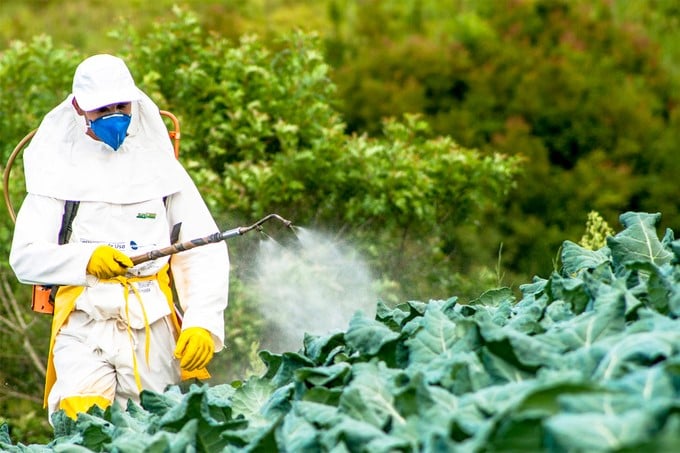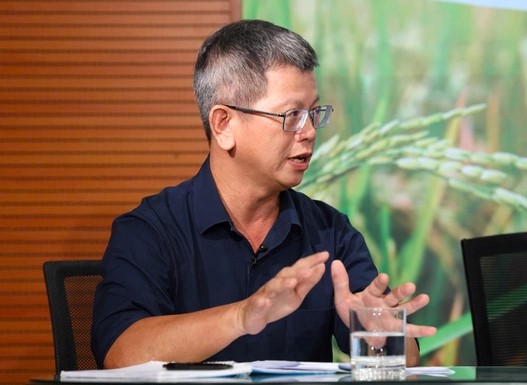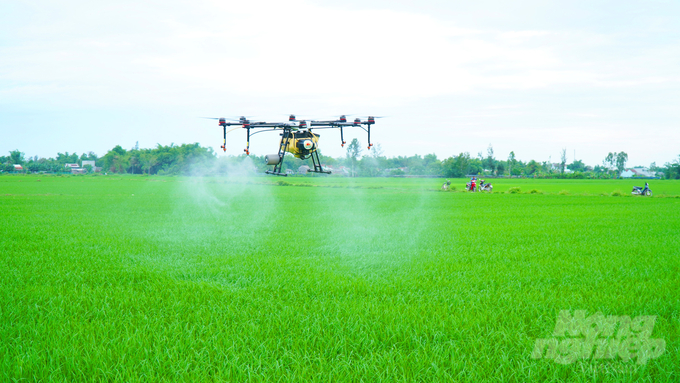December 10, 2025 | 17:12 GMT +7
December 10, 2025 | 17:12 GMT +7
Hotline: 0913.378.918
December 10, 2025 | 17:12 GMT +7
Hotline: 0913.378.918

MARD has approved the Project on developing the production and use of biological pesticides until 2030, with a vision to 2050.
In December 2023, MARD approved the Project on developing the production and use of biological pesticides until 2030, with a vision to 2050" (referred to as the Project).
Accordingly, with a vision to 2050, Vietnam strives to become a country with the leading rate of use of biological pesticides in the region. Industrial-scale biological pesticide production facilities have modern technology and equipment, proactively producing advanced biological pesticides to meet domestic needs and export.
The Project also requires building models for nine different crop types and increasing biological pesticide production capacity in Vietnam. In fact, currently, among more than 100 factories producing pesticides, about 80% of factories produce biological pesticides, but the output is still low.
Talking at the seminar "Proper understanding of pesticides" on the afternoon of November 8, Ms. Bui Thanh Huong, Head of the Pesticides Office (Plant Protection Department), said that the Project now has separate policies for biological pesticides.
These policies support the safe and effective use of biological pesticides, as well as the development of production and construction of biological pesticide application models. At the same time, the Project aims to build processes and provide specific instructions to ensure that farmers' use of biological pesticides meets standards.
This is an orientation consistent with the general trend in the world. Therefore, international cooperation is an important part of biological pesticide management and registration, helping Vietnam harmonize with regional standards. The Project also creates conditions for businesses to register and develop biological plant protection products.

Mr. Nguyen Huu Quang, expert of CropLife Vietnam, discussed at the seminar "Proper understanding of pesticides" on the afternoon of November 8.
Mr. Nguyen Huu Quang, an expert at CropLife Vietnam, shared that this is the commitment of the agriculture and rural development sector to protect the safety of consumers, producers, and future generations.
However, according to Mr. Quang, it is not easy to research a new active ingredient to produce pesticides. As of now, pesticides are one of the products with the most stringent safety assessments in the world. The research process is long and expensive, in which research and assessment on environmental impacts account for two-thirds of the total product research costs.
Mr. Quang cited a study by AgBio Investor: To introduce a new pesticide active ingredient to the market, companies need to invest an average of USD 301 million and take 12.3 years. Because management systems need a long time to both demonstrate the effectiveness of pest control and ensure the safety of the environment and surrounding organisms as well as the land and water environment.
Sharing international experience, Mr. Quang said that Europe has invested about 10 billion euros in research on biological pesticides. In the race to develop biological pesticide products, many large corporations have even acquired small companies specializing in biotechnology to help them go further and gain more scientific basis.

The use of biological pesticides in agricultural production is a suitable choice, meeting the current inevitable trend in agricultural production.
Mr. Nguyen Van Son, Chairman of the Vietnam Pesticide Association (VIPA), noted that the market has currently many new chemical pesticides and special biological medicines capable of quickly and effectively destroying harmful organisms.
However, realizing the advantages of chemical pesticides, many farmers have overused, used wrong techniques, and ignored other plant protection measures, believing that pesticides can solve all pest problems. This reveals many negative consequences, such as polluting water and soil sources, leaving toxic residue on agricultural products, and endangering humans and warm-blooded animals.
In addition, overuse of pesticides also disrupts the natural balance, reduces biodiversity, creates new harmful organism species, and increases medicine resistance, leading to disease outbreaks and recurrences, which reduces the potency of the medicine.
Meanwhile, biological pesticides are usually safe and less toxic to human health, beneficial organisms, and the environment, decompose quickly in nature, have a short quarantine period, and leave little residue in agricultural products. So it is very suitable for use in crop groups such as vegetables, tea, fruit trees, etc.
Market demand is increasing for organic food, so the use of biological pesticides in agricultural production is a suitable choice. Many large corporations in the global food industry also aim to trade agricultural products using biological pesticides in production.
Translated by Thu Huyen
![Unlocking carbon credit potential: [2] Story of Pu Hu forest](https://t.ex-cdn.com/nongnghiepmoitruong.vn/608w/files/huyenvt (e)/2025/12/09/3813-2-171042_611.jpg)
(VAN) Revenue from emission reductions has brought major changes to the Pu Hu Nature Reserve, from improving community livelihoods to strengthening linkages for sustainable forest management.
![Unlocking carbon credit potential: [1] Toward a green economy](https://t.ex-cdn.com/nongnghiepmoitruong.vn/608w/files/huyenvt (e)/2025/12/09/1340-2-130237_804.jpg)
(VAN) Thanh Hoa is advancing the development of carbon credits from forests and agriculture, generating sustainable income, improving livelihoods, and moving toward a green and low-emission economy.

(VAN) After three years, Project FST/2020/123 collected approximately 3,000 insect specimens, classified them into about 50 morphological groups, and identified around 40 species, including several new species.
/2025/12/01/0509-2-175427_206.jpg)
(VAN) Emission-reducing coffee areas in Lam Dong have entered the new crop with stable yields, improved quality, and a remarkably enhanced cultivation environment.

(VAN) The Institute of Agricultural Sciences for Southern Vietnam (IAS) marked its 100th anniversary in Ho Chi Minh City, celebrating a century of growth as a leading institute contributing significantly to Viet Nam’s agricultural development.

(VAN) An increasing number of livestock farms are using biogas generators to create a source of renewable electricity, helping to save costs and mitigate environmental pollution.

(VAN) Small changes in rice cultivation, from irrigation methods and straw collection to input management, are paving a new way for Vietnam's agriculture in the journey toward emission reduction.